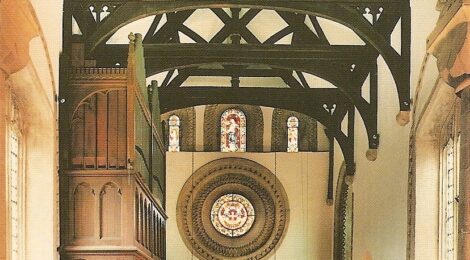
SERMON: A community of healing
A sermon preached by Nikolaj Christensen on 18 October 2020.
It’s a fortunate coincidence that the feast day of Saint Luke falls on a Sunday this year of all years. ‘Luke, the beloved physician’, the ‘dear doctor’, as he is described in the Letter to the Colossians. That little phrase, that little mark of appreciation for someone who clearly had a unique role in the early Christian community, ought to inspire us as well. Our doctors and all others who work in healthcare need our love and our prayers and care at this time. They have worked hard already, and they are now facing a very uncertain future: Is this second wave going to be worse than the first one? Will people abide by the restrictions and keep one another safe? Or are we so desperate to pretend to be back to normal that we will end up making everything much worse?
Our medical professionals – doctors, nurses, physiotherapists, paramedics, and so on – have shown incredible resilience and self-sacrifice during this crisis. Through the first wave and beyond they have treated those with the virus, both high and low, young and old, people who had been careful, and people who had been reckless. I am confident that Luke was a much-loved doctor because he demonstrated just this kind of generous attention to the individual regardless of status and background.
Why am I so confident of that? Scholars debate whether there’s any evidence in the writings that carry Luke’s name that they were written by a physician. But here’s why I think it makes sense that they may have been written by not just any doctor but a very good doctor, who took a certain skill or character trait from his work as a doctor and applied it to his work as an evangelist. It’s clear from the Gospel of Luke that its author had an eye for the outcast, the lowly, the disregarded. Women, children, and foreigners are brought to the forefront time and time again in the writings that bear Luke’s name. He wants us to know that Jesus had special regard for those that others disregard. They have a special place in God’s heart. In Luke’s Gospel, the good news is not just the person of Jesus or his teaching or his miracles, but the good news is also the company that Jesus keeps.
Out of today’s readings I do think it’s the Psalm that best captures the distinctive good news of Luke’s Gospel:
‘The Lord … gathers together the outcasts of Israel.
He heals the brokenhearted
and binds up all their wounds. …
The Lord lifts up the poor’.
You can hear echoes of this in Luke chapter 1, in Mary’s song which reflects on the promise that the child she is carrying brings:
‘My soul magnifies the Lord, …
He has brought down the powerful from their thrones,
and lifted up the lowly;
he has filled the hungry with good things,
and sent the rich away empty.’
In Mary’s child, Jesus, we see a picture of the Lord who we can come to with our broken hearts, our wounds, our shame. That’s the message Luke wants to bring home to us.
And finally, Luke’s attention to all people is something not only healthcare professionals but all of us ought to imitate. Jesus not only loves us, but he also allows us to participate in his kingdom. In our reading from the Gospel of Luke today it is not only the 12 apostles but as many as 70 disciples who are sent out by Jesus. And they are sent out not alone but in pairs – to gather in the harvest, or in the words of our Psalm, to gather together the outcasts. And through this work of gathering Jesus establishes a community of healing. Someone has said the church is not a museum for saints but a hospital for sinners. The church is full of people who have not yet been made perfect. So let’s continue to bear with one another and love one another, as God has loved us.





